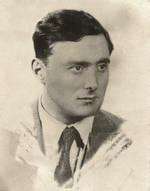Károly Pap
Károly Pap (September 24, 1897 – January 31, 1945) was a Jewish-Hungarian writer.[1][2]
Life

Károly Pap was born in Sopron (then located in Austria-Hungary, and currently located in Hungary) in late 1897.[2] He was the third child of Miksa Pollák (1868–1944), who was the rabbi of Sopron.[1] He volunteered to fight in World War I, and ended up being an officer on the Italian Front.[1] After the overthrow of the Communist Hungarian Soviet Republic in 1919, Pap was briefly jailed due to previously fighting for the Communists.[1] Pap moved to Vienna, Austria for a short time period afterwards, and he also spent time with a touring theater company.[1] "Lajos Mikes and the founding editor of Nyugat, Ernő Osvát", encouraged Pap to write literature.[1] Pap established many friendships with significant writers, who in turn appreciated and supported his work. However, Pap made little or no money from his literature, causing him to live in "desperate poverty" (his wife had to work as a writer as well for them to earn at least a small amount of money).[1] He wrote his earliest drama, Leviát György (George Leviát), about the experiences of assimilating Jews fighting in World War I.[1] It was written in 1926, but was "published only seven decades later."[1] Pap wrote several novels in the 1930s and an essay on the "Jewish Question."[1] Pap's greatest novel, Azarel, was published in 1937 and also dealt with Jewish assimilation in Hungary.[1] Pap continued to write and (remain popular in Hungary) in the early 1940s, even after being sent to a "compulsory labor camp."[1] Later on, Pap was deported to Buchenwald.[1] Pap died in 1945, "possibly in Bergen Belsen, shortly before" the British Army liberated it.[1]